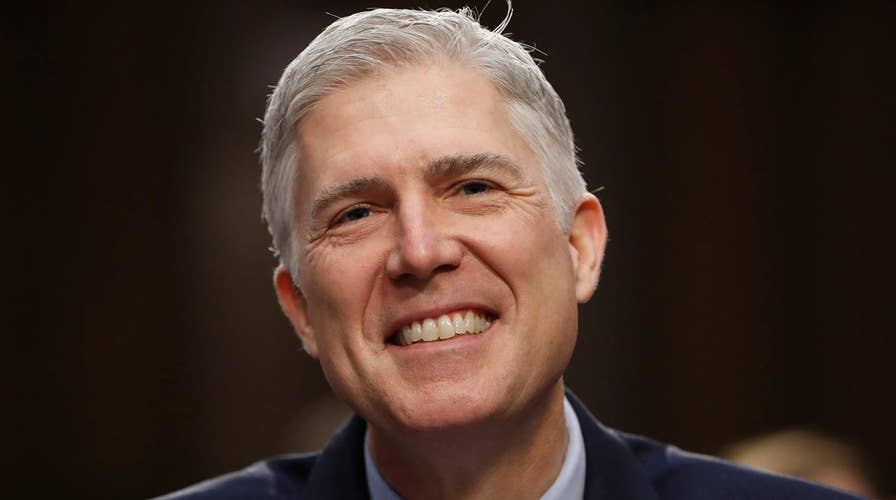Senate confirms Gorsuch as the next Supreme Court Justice
Williams: Democrats view Gorsuch as the heist of the century
The Senate confirmed Judge Neil Gorsuch to the Supreme Court on Friday, filling the critical ninth seat that has been vacant for over a year and capping a tumultuous debate that saw Republicans overhaul the way the chamber operates in order to overcome what they described as an unprecedented Democratic filibuster.
The 54-45 vote, in which three Democrats crossed party lines to support the appeals court justice, is expected to restore a 5-4 conservative tilt on the bench. Once sworn in, Gorsuch will join the court and begin to hear cases, in the seat once held by the late Justice Antonin Scalia, who died in February 2016.
“He’s going to make the American people proud,” Senate Majority Leader Mitch McConnell, R-Ky., said.
President Trump congratulated Gorsuch via his official White House Twitter account:
Congratulations to an exceptionally qualified and respected judge on his confirmation to the Supreme Court! #SCOTUS https://t.co/itTom467MT
— President Trump (@POTUS) April 7, 2017
Republicans lauded Gorsuch as an eminently qualified jurist and a fitting successor to Scalia. But Democrats accused him of giving evasive answers during his confirmation hearing, and claimed his past rulings showed a tendency to favor business interests over workers. More broadly, Democrats remain furious that Republicans under McConnell’s leadership blocked consideration of former President Barack Obama’s nominee Merrick Garland, in turn allowing Trump to nominate Gorsuch.
These partisan tensions exploded on the Senate floor this week, as Democrats mounted a filibuster against Gorsuch, prompting Republicans to use what’s known as the “nuclear option” Thursday to force a final vote.
Each party blamed the other for the escalation, accusing the other side of damaging long-standing institutions.
“Damage was done to our democracy,” Sen. Richard Blumenthal, D-Conn., said Friday. “Raw political power has been exercised to break the rules and norms of this body.”
But McConnell claimed that Republicans only triggered the nuclear option to “restore norms” that Democrats had defied.
Republicans pursued that course after Democrats blocked the nominee on Thursday, denying him the 60 votes needed to proceed to a final roll call. McConnell in turn executed a series of parliamentary maneuvers that resulted in the threshold being lowered to 51 votes. With that standard, Gorsuch easily advanced to the final vote on Friday.
McConnell said he made the move “for the sake of our country.”
McConnell’s predecessor as Senate majority leader Harry Reid, now retired, took the first step down the “nuclear” road by lowering the threshold for other nominees in 2013 – a controversial move Republicans frequently brought up on the road to Friday’s final vote.
But lowering the threshold for a Supreme Court pick is a more significant step. It means for the foreseeable future, the minority party will have significantly less leverage to oppose any nominee to the highest court in the land, no matter who is president.
Senate Minority Leader Chuck Schumer, D-N.Y., said there will be “less faith in the Supreme Court” going forward.
Republicans say Democrats have been unfair to an otherwise qualified nominee and have wrongly cast him as an ideologue.
“Rarely has this body seen a nominee to the Supreme Court so well-qualified, so skilled, [with] such command of constitutional jurisprudence, with such an established record of independence and such judicial temperament,” Sen. John McCain, R-Ariz., said Friday.
All Republicans present voted yes on Friday; Sen. Johnny Isakson, R-Ga., struggling with health issues, did not vote. Vice President Pence presided.
The three Democrats who voted for Gorsuch were North Dakota's Heidi Heitkamp, West Virginia's Joe Manchin and Indiana's Joe Donnelly -- all moderate Democrats facing challenging reelection bids next year in red states.
Gorsuch is expected to take the oath on Monday.
Fox News' Chad Pergram and Bill Mears contributed to this report.






















